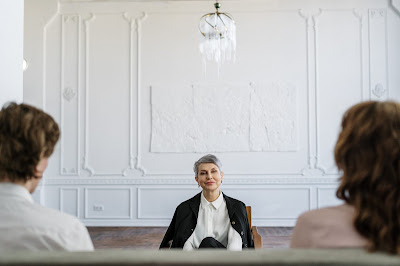Divorce proceedings can be vicious, protracted and very expensive. Fighting to the last breath is destructive and usually denies the divorcing couple any chance of being able to enjoy or even contemplate attending future family occasions.
Marriages, christenings and even funerals become a battlefield where old wars are refought with new weapons and undiminished enthusiasm.
It never ceases to amaze how two people who once loved each other enough to join their lives together can rip each other apart in the name of fairness and justice. There is another way, (apologies for stealing the old strap line of NatWest, widely believed to be one the most incompetent banks in the world) it's called mediation.
Mediation
Family mediation is the most widely practiced form of mediation. Usually, the family mediator sees both parties together at a number of sessions. Clearly, the couple must be on speaking terms and agree to cooperate in the process.
Family mediators come from a variety of backgrounds and so bring a wide knowledge, experience and common sense to the process of reaching an agreement. If a problem needs legal advice they can always refer to a solicitor for clarification and guidance.
What do mediators do
The mediator works out an agreement for the division of the family's assets and child maintenance. When an agreement is reached, the mediator prepares a summary for each spouse. This will then be handed to solicitors to be translated into a Court document.
Mediation is a way of avoiding the British adversarial legal system which is often best suited to murder trials and commercial litigation rather than the emotional mayhem of a disintegrating marriage. The government has encouraged this form of conflict resolution for many years through the Family Law Act 1996. We can put you in touch with a local Family mediator or you can find a local mediator through the following organisations:
National Family Mediation 0207 485 8809 and www.nfm.org.uk
The UK College of Family Mediators 0207 391 9162 and http://www.ukcfm.co.uk/
Family Mediation Helpline 0845 6026627
What happens if it does not work
If this mediation fails then you will have to use the traditional route using lawyers and possibly be back to the mud and blood of trench warfare. So it's really worth trying hard to reach a mediated agreement because if you don't the court will enforce one on both of you.
a better way to divorce. Part Two - My Life After Divorce : Reasons and Support, UK
Our legal system is based on the concept that the best way to sort out a problem, be it a divorce or a personal injury case, is for each side to hire a lawyer and for them to slug it out in court.
OK for an industrial injury but not such a good plan when it comes to sorting out the emotion sodden wreckage (not to mention finances) of a relationship between two people who once loved each other.
Mediation
This works on upon an entirely different concept and relies upon each of you genuinely wanting to divorce in a civilized and least damaging way possible. Without this commitment the process it will fail and you will need to go the traditional route with solicitors from day one. Mediators come in a number of different flavours from the plain Vanilla of Relate (not strictly mediation, but a very useful place to start) to the Rum ‘n' Raisin of a ‘collaborative law' approach.
Family Mediation
The most popular is the Family Mediation where an experienced mediator will meet with both of you together and cover all aspects of the divorce. Some will also meet with each of you separately at least initially. This can be very useful as some progress can be made before the three of you meet together to continue towards a comprehensive agreement. Family Mediators Association 01179 467180 or http://www.fmassoc.co.uk/
Solicitor Mediators
An interesting hybrid of lawyer and mediator whereby one person can act for both parties. The advantage is that they are legally qualified and can work with you to take the whole process to a conclusion. The British Association of Lawyer Mediators 01483 235000.
Collaborative law
This is an idea which combines the two concepts of mediation and legal confrontation. You sit together around a table each with your lawyer and try to work out an agreement. For many this will provide the right balance between soft mediation and the rough and tumble of a court room skirmish. However, if this does not work then new lawyers have to be appointed as the existing ones are not permitted to continue.
Whichever way you go there are a number of ways to solve the difficult and emotionally charged issues that are at the centre of your divorce. In the end the traditional approach of a lawyer each and little contact between you may be best. However, try a little mediation first, it just might work.

